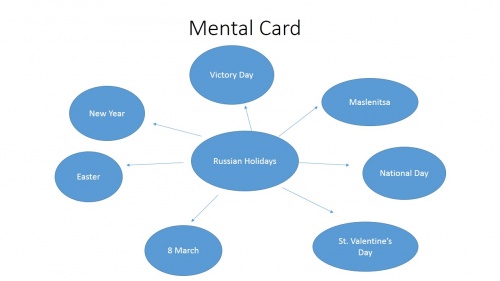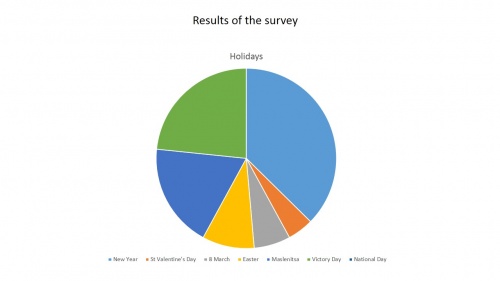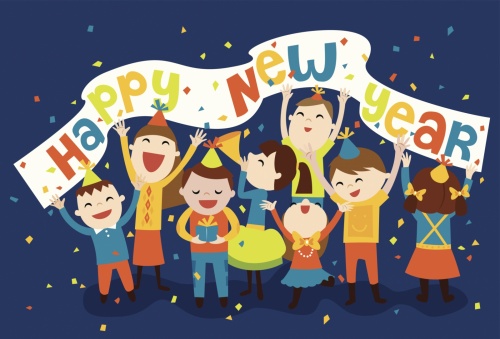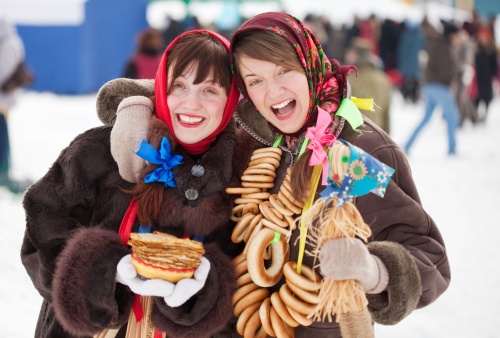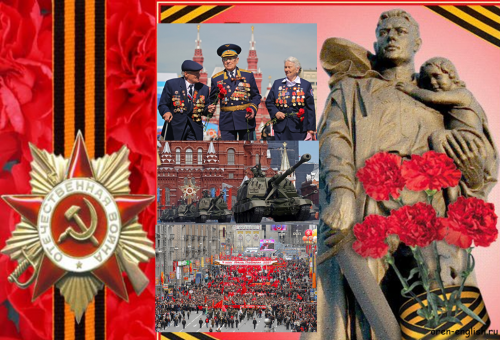Результаты исследований обучающихся в проекте Feasts
Содержание
Авторы и участники проекта
Факеева Валерия Анатольевна
Маркелова Елена Сергеевна
Участники группы "Россияне"
Тема исследования группы
Feasts
Проблемный вопрос (вопрос для исследования)
Какие праздники можно считать основными в России? Как их отмечают в этой стране?
Гипотеза исследования
We think that main feasts in Russia are New Year, The Day of Victory and The Easter. All russians celebrate these holidays every year. They like them very much.
Цели исследования
1. To find out the most famous feasts in Russia.
2. To point out when and how people celebrate them.
3. To make a mental card about the most impressive feast.
Результаты проведённого исследования
1. At first, we decided to make a list of holidays in Russia. For that, we offered our classmates to make a mental card with their favourite holidays.
2. To find out what holidays are popular in Russia we conducted a survey. We gave people a list of different holidays and they have to pick out the most popular in their opinion. After that, we made a diagram which shows that Victory Day, Maslenitsa and New Year are the most popular holidays in Russia. Here it is:
3. Now we want to tell you about these holidays.
4. New Year.
New Year’s in Russia is celebrated on December 31 and it is probably the most exciting holiday of the year.In our country, New Year is a public holiday, during which most companies and offices are closed. Also, every city has special New Year’s celebratory events - concerts for kids, performances, different holiday fairs. The streets are decorated with fir trees and lights. New Year is a family holiday, celebrated usually at home in a circle of close relatives and friends. Preparation for the holiday begins in the middle of December. People carefully plan their celebration and buy presents. Almost every family buys a New Year fir tree, which stands in the corner of the room and is decorated with glass toys, sweets, and garlands. On the 31th of December most of the people start the celebration around 10 pm. Everyone gathers at the table to remember the outgoing year and its happy moments, to discuss future plans and tell each other best wishes in the upcoming year. New Year's dinner usually includes Russian traditional dishes: Olivier salad, dressed herring, sparkling wine, and tangerines. An irreplaceable part of the New Year's celebration is a special president’s speech, which begins 5 minutes before midnight. It is about the events of the year, achievements and hopes for a better future. When the clock strikes midnight, people start to toast with champagne and wish each other “Happy New Year”, while listening to the national anthem. The symbol of a Russian New Year is Ded Moroz (Father Frost), which is a national version of Santa Claus. He is believed to bring gifts to well-mannered children, delivering them in person on New Year's Day. That’s why some people love to dress up for their kids as Ded Moroz. He also has a granddaughter, Snegurochka (Snow Maiden). Their residence is considered to be the town of Veliky Ustyug, Vologda Oblast. Together they spread the festive mood.
5. Maslenitsa.
Maslenitsa is one of the most favourite holidays in our country. It lasts from Monday till Sunday. It comes either at the end of February or at the beginning of March, this is so-called movable festival. In 2002, Maslenitza took place in March (from 3d up to 9th). This holiday means the end of winter and the spring coming. It has pagan origin. During this holiday people visit each other, children play snowballs, light bonfires, enjoy horse-sledging. During these days people should avoid eating any kind of meat, but they are to eat much butter, cheese, sour cream, lots of pancakes. Lent follows Maslenitza, it is the strictest and long holiday, it lasts 7 weeks. During these weeks people avoid eating fat meals, meat and there are few entertainments. People must work hard, pray and clean their soul.
6. Victory Day
One of the most remarkable public events in Russia is the Victory Day. It is traditionally celebrated on the 9th of May. The holiday marks the capitulation of Nazi Germany to the Soviet Union in the Second World War in 1945. It became the end of the Great Patriotic War for the USSR, which lost about 25 million citizens in the four years of fighting and starvation. Every year all cities across the country have lots of parades and celebrations. Even though the fact that the holiday is celebrated cheerfully, May 9 is a sad day for the majority of our population. Many people have lost close relatives and friends in this terrible war. Almost every family in Russia has a person who didn’t return from the battlefield. A great number of people were seriously injured and became disabled. On this day we are grateful to our saviors, to those who sacrificed their lives for us. That’s why we try to celebrate this day with honors. There are some traditions that we follow. We give flowers, usually red carnations, to veterans in the street and lay wreaths at war memorial sites. Neighborhood schools may host a program prepared by the students, featuring wartime songs and poetry. Also, there is St. George ribbon campaign, which has occurred on the eve of the Victory Day for nine years already. Millions of Russians and compatriots in 100 countries take part in this campaign. Orange–black ribbons handed out by volunteers in the streets are one more sign of our commemoration of the Great Victory. At home, we gather around a festive table to honor survivors and honor those who passed away. We may also watch a favorite Soviet film based on the events of World War II.
Вывод
As a result of our research, our group found out which holidays are most popular in Russia. We learned a lot of new information about various holidays in Russia and in America : their history, impact on local residents and the reasons for their occurrence and importance for the country and residents. This project has helped us develop our socio-cultural aspects and become closer to our country and the country of the language being studied.
